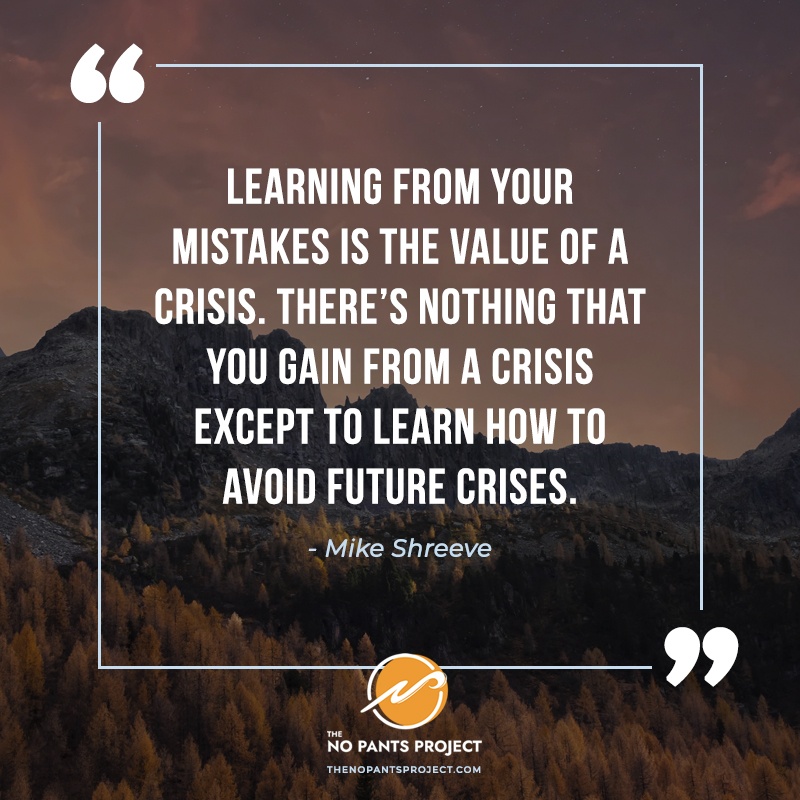Listen to this Podcast:
Listen on Anchor Listen on Spotify Listen on Apple Podcasts
SUMMARY
- In this episode of The No Pants Show, we’re going to talk about how to get through any crisis. I think it’s timely because we’re currently in the middle of a pandemic.
- Now this will sound horrible and arrogant, but while the pandemic is awful and the consequences are very real, this is not the first time that human beings have experienced a crisis. This is not to downplay what’s going on here, but we’ve been through worse, and that should be good news for us. You’ve survived crises before. You’re going to be fine because you’re hardwired to get through this. The ability to survive is already inside of you. I’m just going to give you a few tips to better pull it out.
- Tip #1: Create Distance
It’s not a good idea to hit refresh on Facebook News every 10 minutes for the latest headline on the coronavirus. I’m not suggesting you stop seeking information, but scaling it back might be a better approach to minimizing unregulated emotion, which is the most dangerous thing in crises. - In aviation, they teach you that the riskiest part in an emergency isn’t the mechanical failures; it’s the welling of emotions (fear, anger) that clouds your ability to make good judgment.
- Some ways to create distance are: removing yourself physically from the environment, not being on social media, not checking your business stats every couple of minutes, practicing meditation (emotional distancing), and separating your identity from the crisis.
- Tip #2: Journal Accurately
Distancing ourselves allows us to see accurately. Now we need to start recording accurately. When you’re not recording what’s actually happening during a crisis, you will have an inaccurate image of what’s going on. And dealing with a crisis with an inaccurate image will very likely lead to you making the wrong decision. - When I journal I try to get as granular and accurate as possible. As I’m doing that, I’m still in distance mode so I can remain objective. There will always be some level of emotion, but we want to try our best to be as accurate as possible. We ask ourselves, “What exactly is happening right now? What did we try? What are we doing?” And then, “What is the real problem? What is the real solution?”
- Tip #3: Identify Gaps
Most general aviation accidents are caused by what’s called pilot error. Almost never did these crises appear all of a sudden from nowhere; rather, they’re the result of the pilot making a series of bad decisions over time. The same is true in business. You don’t have a business and then suddenly not have a business, unless you’ve done something illegal. - Tip #4: Get Help
Get help with creating distance. Have somebody else take a dispassionate look at your business to help you understand what’s going on and come up with a possible solution. Have someone make sure you never make the same mistakes again. - Navigating a crisis is certainly manageable when following these steps. Ultimately, you’ll have the ability to prevent future similar crises. The good thing about a crisis is that you’ll remember it once you solve it.
HOT NEWS & DEALS
- Free Training! How I Scaled To $100k/Month+
For anyone serious about scaling their service business, this training will cover the 4 Stages To 7-Figure Growth. Perfect for the coach, consultant, or freelancer stuck in a hamster wheel business who wants to grow and scale. - 15 Ways To Double Profits During Hard Economic Times Report
Need a few tips to help you through the hard times? Download this 40+ guide and I’ll show you what I do to help businesses thrive during even down turns. - Download ‘The Anti-Commodity Formula’ Workbook!
Learn how to attract your ideal clients and customers, charge more than your competition, and build a business from a home that you love.
INSPIRATIONAL QUOTES
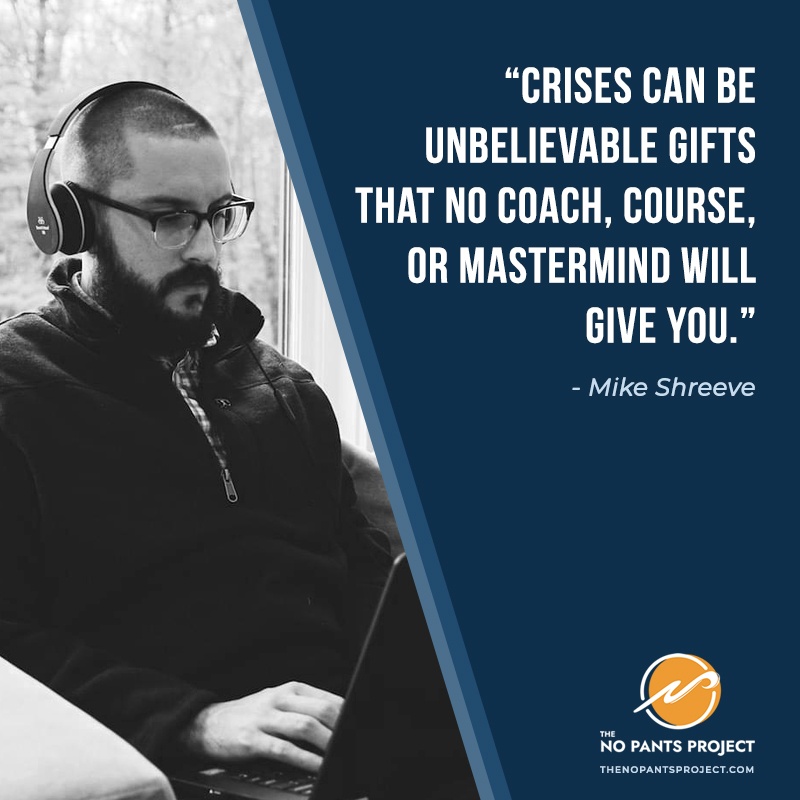
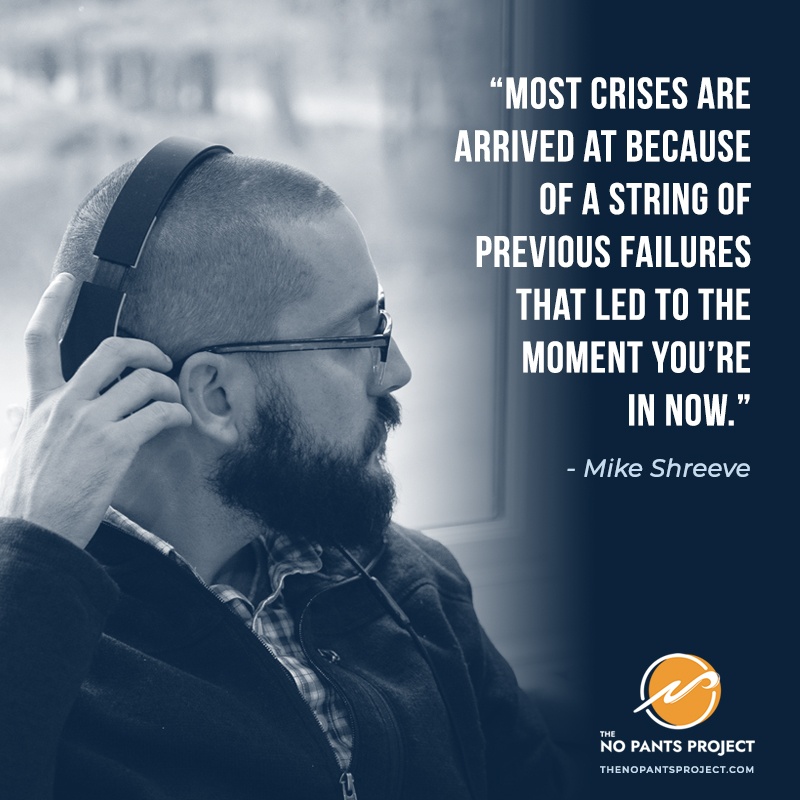
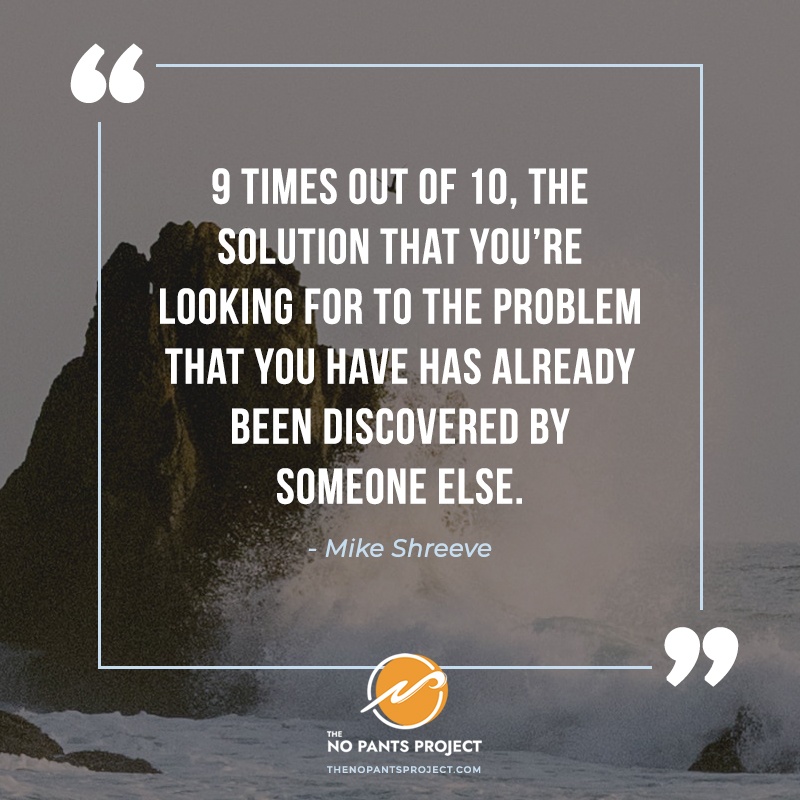
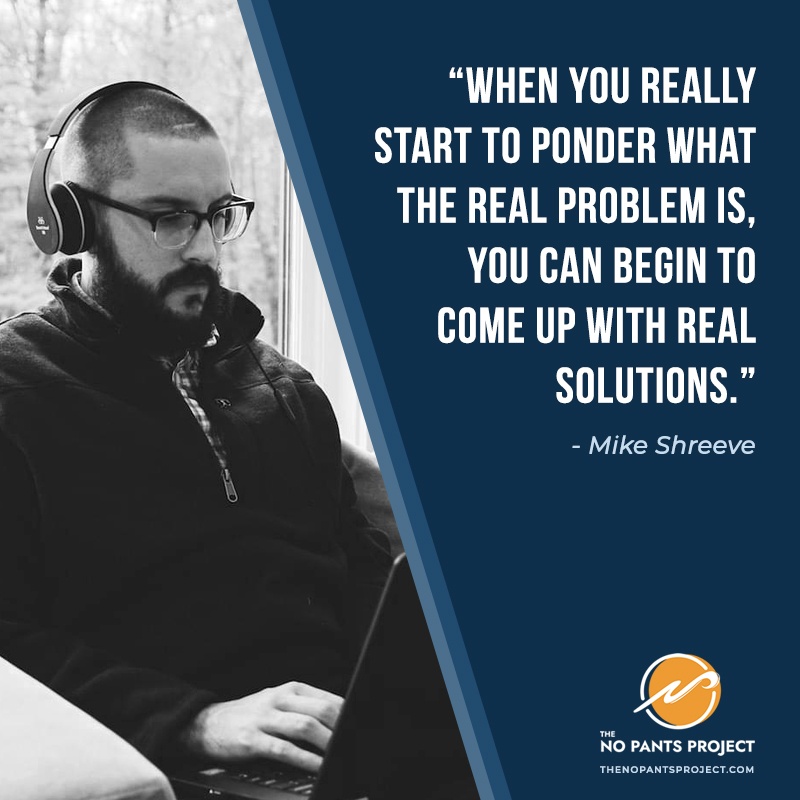
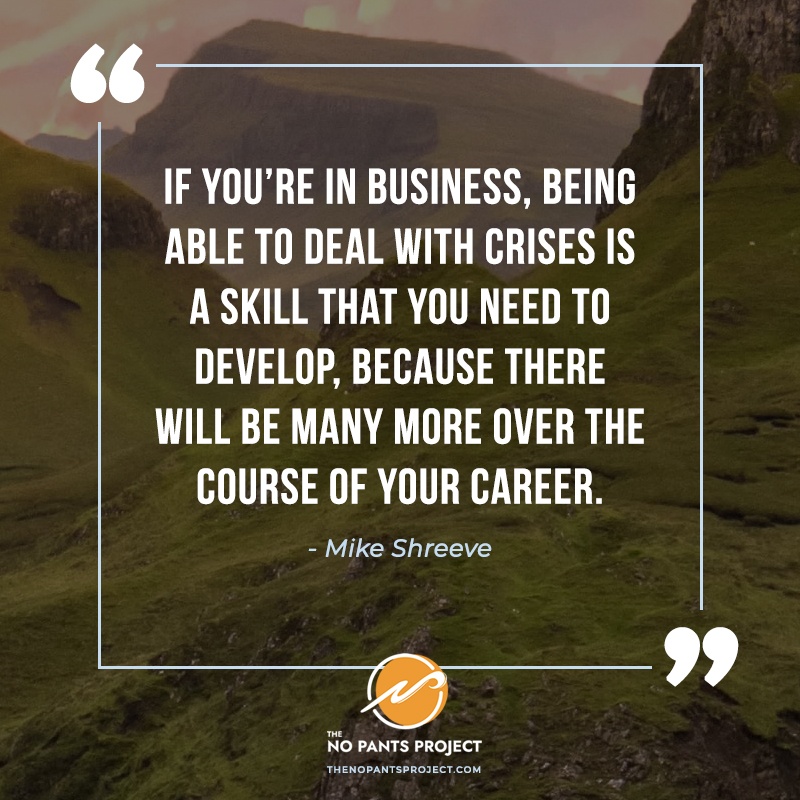
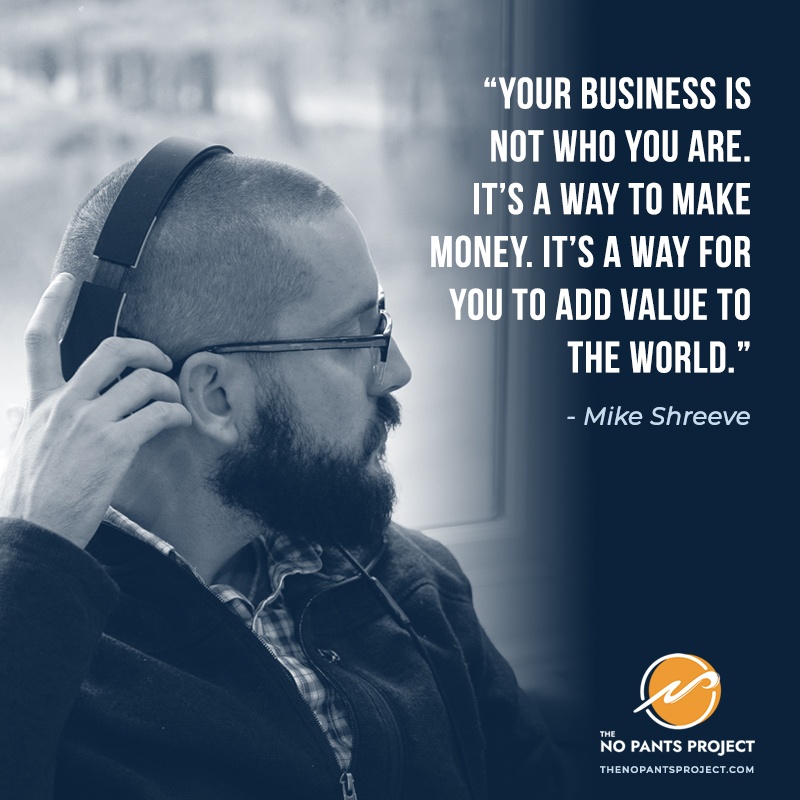
FULL TRANSCRIPT
Hello, my dear friends. I hope that you are doing well. I got to say, I am happy to be back doing these podcasts. I have missed sharing this stuff with you. Um, so I’m really, really happy to be back. Uh, one of the things that we’re gonna talk about today is how to get through, um, any crisis. Now, I think it’s timely because we’re in the middle of this pandemic. We are, um, I would say still in the early stages, but certainly going through, uh, what is going to be some very difficult economic times. I think something that a lot of people haven’t even talked about is the knock on effects, the butterfly effect of these things that are happening, right. We’re, we’re still sort of in first order consequences level, there’s going to be second and third order consequences beyond all of this. So we’re definitely in a crisis.
Okay. Now I’m going to say something that will sound horrible and arrogant, but I hope that it will reassure you about what I’m going to tell you. So the pandemic is horrible. It’s awful. The consequences are very real. Um, businesses. Some of my friends, businesses are just have just been decimated. People are losing their jobs. Um, they’re losing what they’ve worked their whole life for. Um, people are dying. Obviously lots of people are dying. Uh, even the people who aren’t dying are walking away with permanent damage, um, to their heart, to their lungs. Uh, even the people who don’t have permit damage and they just get really sick. It’s pretty awful. Uh, you don’t have to look very far to just hear the actual unbiased firsthand accounts of people who’ve actually gotten sick. And it sounds pretty, pretty bad with all that said, um, this is not the first time that human beings have been through a crisis.
I would, and this is not to downplay what’s going on here, but this isn’t even close to the worst crisis that we’ve ever had. I mean, not even close, which should be good news for us because human beings have survived crisis after crisis. And if I can be Frank with you, you yourself have also survived crises before. This is hardly the first time you’ve ever been stressed. This is hardly the first time you’ve ever been afraid. This is hardly the first time you’ve had some negative consequence, uh, placed upon you by an external force, meaning something outside of your control happened. And now you have to deal with the consequences. I can tell you for myself, I grew up in crisis mode. I’ll spare you the details. But one example, we moved every six months, 28 times, by the time I was 18, that’s not a crisis free environment.
You don’t move that often. Cause things are great as a business owner. And those of you who are listening to this who are business owners, you know, that crisis, especially when you start getting into scale is kind of par for the course. There’s all sorts of studies that say, um, things like a divorce or things like getting laid off from your job or things like moving like these very, um, uh, high crisis, high stress events, um, you know, they have longterm knock on effects and things like that. Um, but there’s also evidence that, uh, business owners go through maybe even per year, one or two of those events. And let me give you an example. Um, the person who loses their job, uh, probably feels the same way, uh, that a business owner feels when they have $80,000 in payroll, they have to pay in one week and they have $5,000 in the bank account.
That’s probably the same stress level, right? Uh, so anyway, the point that I’m making is, uh, the first step in getting through a crisis is to understand that even though it feels like it, this is not the first crisis that you’ve gotten through. Okay. Um, also it’s probably not the last crisis you will go through. Every generation has multiple crises that face that generation. Um, there’s nothing unique or new about human beings going through hard things. Now at first that might feel discouraging to you. I would recommend that you spend some time pondering and meditating that idea, because what it really means is that you come hardwired to get through this, even without the tips and tricks that I’ll tell you here, okay, I could just end this and say, you’re going to be fine because you’re programmed to be fine. And for many of you that would click the light bulb on that you are going to be okay.
Um, no matter how bad it gets, okay. Even if the worst happens to you, you’ll be okay because you are programmed to be okay. All right. So that’s the first thing that you have to understand is that this is already inside of you. I’m just going to give you a few tips to better pull it out. And in order to survive through this crisis and when the pandemic is over, hopefully you will continue to live your life by these general rules. Because if you’re a business owner, I’m like my wife and I were talking the other day, a lot of our friends that don’t own a business are starting to sound like my wife and I, um, you know, we’ve been through a couple of financial crises because of B being a business owner. I mean, I don’t think I talk about it too much, but I’ve had some pretty big business failures in the past. Um, and so, you know, the uncertainty of how are we going to hit payroll? Are we going to be able to pay our rent? Things like that, that happens sometimes even when you have an amazing year, sometimes that does happen. Um, so again, if you’re in business, D being able to deal with crisis is a skill that you need to develop because there will be many more over the course of your career. Okay? So here’s four things that I do when I feel a crisis coming on. The first one is that I create distance.
It’s not a good idea to hit refresh on Facebook news every 10 minutes for the absolute latest headline about the Corona virus that I’m just going to put it bluntly. That’s not a good strategy for dealing with a crisis. Now I need to make a huge disclaimer here. Um, I’m not suggesting that you stop seeking information and updates about what’s going on, but maybe scale it back to checking once in the morning and checking once in the afternoon or scaling to checking once a day or scaling to checking once every other day, that might be a better approach to minimizing the most dangerous thing in crisis, which is on regulated emotion. Let me give you an example. So you may know that I am in aviation. I love aviation. It is my passion. I am so sad for all of the aviators who, whose jobs are at risk.
There’s going to be furloughs. Aviation industry is just being gutted right now by everything that’s going on. I love aviation and being able to see the world and travel, and I love flying planes, and I love everything about planes. One of the things that they teach you is that when things get bad, when an emergency happens, the riskiest part of dealing with that emergency, isn’t the mechanical failures. It isn’t the airplane structure. It isn’t, it’s not those factors. It’s the welling of emotion of fear. Um, in some cases of anger, uh, it’s that welling of emotion that clouds your ability to accurately translate what’s going on around you, and then makes difficult the ability to take that translation and make a decision for the positive. Okay. In other words, that’s a long winded way of saying if solely, okay. You know, the miracle on the Hudson, if solely had begun to focus too much on all of the things that were going wrong and had a well of, uh, unregulated fear, unregulated fear, not that he didn’t have fear, it’s not that you have to be unafraid when a crisis is happening. It’s when the fear is unregulated. When it is out of control, when it is all consuming. If that had been the case, that certainly would not have been a miracle on Hudson. He had options to go to different airports. Um, and even during the investigation, there was some doubt as to whether he could have made those airports and et cetera, et cetera, et cetera, et cetera, the point being on regulated emotion, clouds, your ability to make good judgment.
And so step one of dealing with a crisis is to get that on lock. In, in other words, to minimize the unregulated aspect of emotion, you’re never going to get rid of emotion. There’s no point in even trying to get rid of emotion. That’s like trying to get rid of breathing and thinking you’re still going to be a human being. And fear is sometimes a good thing to have. The video keeps, you know, it keeps people in between the lines when they’re drive that they’re afraid of, of crashing and things like that. Is there, there are, there are positive aspects to it, but one of the fastest ways to have emotion take over is to constantly poke at the fire in this case, if you’re afraid of what’s going on with the pandemic, one of the worst things you can do is check every five minutes about what’s going on with the pandemic, especially reading these headlines, reading the misinformation, reading the talking head, that’s just trying to get airtime.
And I mean, there are a lot of triggers for increasing fear and actively pursuing the inputs of all those fears will lead to clouded judgment. And that’s never a good thing to have in a crisis. So there’s a couple of ways to create distance. One of them is your physical environment. So for example, in where my office is, um, w it’s a, it’s an area that, I mean, I’ll just say it. They don’t believe that the coronavirus Israel, I don’t know why they don’t believe Israel. And so in the office building, nobody was wearing a mask. Nobody was wearing a mask, nobody was social distancing, nobody was doing any of this stuff. And I went to the office, um, because I really it’s like really important to me lately that I keep my business separate from, uh, my family. Um, and there was things that I have to do at my office, uh, once or twice a week.
So I was going to my office once or twice a week. I was doing my, where my mask doing. The whole thing was wearing gloves, all that kind of good stuff. Well, wouldn’t, you know, nobody’s social distancing, nobody’s wearing masks. And, uh, they, um, the building sent us an email and said, well, we’ve had an, uh, coronavirus outbreak. And two people from the office building are now hospitalized. And it turns out the two people who were hospitalized were like three or four doors down from my office. Now here’s a good example of, okay, I’m not going to the office anymore. If I kept going to the office, guess what? I’m gonna be constantly worried and et cetera, et cetera. Now this, and I have to understand this didn’t just happen. This happened in March. Okay. Like when all this stuff was first happening and people weren’t sure what it was and all that kind of good stuff.
So that’s, that’s one example of removing yourself and of the environment. So that’s a physical example when you’re dealing with a crisis. The other example is just not being on social media, not being with people who are constantly freaking out all the time, not being with people who are et cetera. Okay. Now that’s talking about the Corona virus, but what about a crisis in your business? Well, I’ve been working with a lot of, uh, no pants, project clients who tend to be not like my normal freelancing clients. So when I normally fast with clients, they have to be making at least a half a million dollars a year. They have to have a whole host of et cetera, et cetera, with no pants, project clients. They’re typically more in the earlier stages of their business. One of the things that I noticed is the clients who have the most anxiety, uh, about what’s going on, um, are the clients who check their stats the most often.
Okay. And that’s not a dig on any, on dig on the clients or anything. Um, that’s, uh, the sign of an earlier businessperson, meaning the longer you stay in business, the more, you know, checking your stats every couple of hours is it’s, it’s a great way to trigger her, um, that it, that unregulated emotion. Okay. Checking your Facebook ad comments every couple of minutes, great way to feel horrible about everything that’s going on. Um, so that’s another way of changing your environment is what are you doing right now on the computer or on your phone that is probably stoking the fire of unregulated emotion and how can you change that environment in which it might be a digital environment, but it’s still an environment when I’m in financial problems. Right? Cause I’m scaling my business. Right? So one of the big things we got to worry about is cashflow.
One of the things that I’m not going to do is refresh my bank account every five minutes or every day, even because what what’s that going to do? It’s just going to keep, it’s like flashing. The things are bad, sign. Things are bad. Things are bad. It’s like just keep reaffirming that things are bad instead of spending that time, doing something, building something, making something better. Okay. Solving the problem. Okay. So that’s one way to create distance between me and the crisis. Uh, and don’t worry that this is the whole, my whole thing is we’re only on one of four. So people are like, wait. So you’re, you’re a solution for dealing with crises is just to like ignore it. No, no, no, no. Create some distance from it. Okay. Stop, you know, uh, generating unregulated emotion. Um, and then of course there’s emotional distance.
So meditation, in other words, what we’re trying to do is lower the volume of the monkey mind, sort of the random thoughts we’re trying to lower that volume so we can look up objectively at what’s going on. And then here’s an important one. I think a lot of people don’t think about when they’re dealing with business crisis. And it’s interesting because I’m seeing it pop up when people are trying to deal with a pandemic crisis and it is separating your identity from the crisis. So for example, if your business is failing right now, one of the worst things you can do is say, I suck because my business is failing.
That is, that is a great way to turn something objective, which is your business into something emotional, which is you. Like you are not your business. I know it’s a Western thing that when somebody says, what do you do for your living? What do you do for a living? And you answer a, as I am like you, you answer as an identity answer. So what you do for a living, I am a writer. It’s a very Western thing to internalize what we do and say, this is who I am, but it’s not who you are.
It isn’t what you’re, your business is a way to make money. It’s a way for you to add value to the world. When you’re in the middle of a crisis, you need to be really clear that those are two separate things. Otherwise you will internalize everything in very negative ways which creates negative, unregulated emotion. And then you’re in trouble. Again, you don’t have the ability to think clearly to make correct decisions. And it’s very interesting to me right now, watching again, civilians non-business people who don’t go through this sort of personal development process and examining themselves and looking, you know, and having these challenges and dealing with them for a lot of people who are going through this, really for a lot of people, this is their first crisis in like a major way. Um, and I don’t mean, uh, uh, like for a business owner, big crisises or kind of like the thing.
And, um, but for a lot of people, this is like a really big crisis and like more than they probably ever dealt with. Um, it’s interesting to see people turning it into almost identity politics. The human need to turn something into this is about me in some way. When in reality, what is happening in the pandemic is that there was a virus and the virus is acting in a way that a virus acts period, full stop. There’s nothing about you in that thing. And yet people have really worked very hard, all sorts of mental gymnastics to turn it into a, a statement of themselves. Um, and I think that’s very dangerous when dealing with a crisis, because for a couple of reasons, one, obviously it increases the unregulated emotion, but whether it’s pandemic or we’re talking about business, if you believe that the crisis is a statement of who you are as a person, it limits your ability to choose because you are limiting what you are able to, uh, view as an acceptable choice based off of how you view yourself as an identity.
Let me give you an example. Let’s say that your business is in crisis. Okay. And you are, um, you’re not separating your identity from your business and you view yourself as a very kind person. Okay? You view yourself as a very kind, like that’s a value that you espouse that you hold dear to yourself. And let’s say that the crisis that your business is in is that you have no more money and half of your clients owe you money. Now, when you’re in a crisis and you are unable to separate identity from the crisis itself, you’re going to be limited in what you can do to collect that money, because you believe that you or your, your, um, how you identify as a kind person is regulating what you should do in that scenario. Now I can already hear some of you saying, Oh yeah. Well, if I was in that scenario, I, I do think kindness is important and et cetera, et cetera. And, and I agree with you, but if there’s a contract where the client owes you money and by them not paying you’re now almost, you know, you’re going to be not able to pay your rent. The belief that your kindness is more important than being able to pay your rent is why you’re in the crisis.
Whereas by separating your identity from the business, you can still collect in a kind way. I’m not saying that you have to forego your values. What I’m saying is the danger is when you completely dismiss collection, because you feel incorrectly that, well, let me put it this way, because your judgment is being impaired by an identity that you believe in about yourself. So what we’re talking about here is separating ourselves from the crisis, not to become detached, not to give us ethical wiggle room to do something we normally wouldn’t do, but to make sure that our decisions during a crisis are not unnecessarily clouded by aversion of unregulated emotion. Let me give you another example. And I know this might be difficult because very few people are in this have ever been in a crisis, right? So it’s hard. Sometimes I know there’s a couple of no pants.
People who are listening to this are totally getting it. Like, I know for example, um, there’s somebody who works in emergency services services, and she’s probably like, yeah, I totally get what you’re saying. Those of you who don’t normally deal with crises, or haven’t ever dealt with crises, this might be a really foreign concept to you. But when I fought fire, I loved my firefighting brothers and sisters loved them. The, I think about them often. And this was like 15 years ago that I was a firefighter. Right. And I still think about them all the time. One of the things that you’re taught is that when it’s time to go put all the niceties aside, because it’s time to go. In other words, there were moments where these brothers and sisters that I love as a firefighter, we’re in polite society, complete a holes because something needed to happen.
In other words, we were in a situation in a scenario, in a crisis in which please, and thank you, had no relevance to getting the command out to the right people as clearly as possible and as timely as possible, that is proper. And everyone involved, it’s not like afterwards, we were all like, why did you yell at me? Why did you say it that way? That was so unkind of you. There was none of that kind of conversation afterwards, because we all knew in that moment that we were in crisis mode and we all instantly separated our identity, separated our, um, feelings, our emotions to get through the crisis alive. I mean, I, I specifically remember being completely manhandled during one fire. I remember somebody grabbing my pack. Uh, this was when we were in Alaska and literally like, just chucking me. Cause, uh, the, my very first fire, I was only 19 or something, 18, 19.
So I was still only like a buck, 40, a buck, 50 and weight, and just chucking me and just be, and you know, th that this is what I’m talking about. Okay. I’m not talking about stop being a good person. I’m saying in crisis mode, you need to be able to do what needs to be done. And the only way to do that is to be able to separate to cause separation so that you can deal with the crisis at hand. All right. So number two, so you create distance so that you can actually solve the problem. You need to be able to see the problem from the distance. You need to be able to not be clouded by emotional judgment. You need to be cool-headed and you need to be able to, um, see things for what they are. Number two is journal accurately.
Okay? So we’ve distanced ourselves so that we can see accurately. Now we need to start recording accurately. I can’t tell you how many times I work with someone I’m recording, what’s going on. So I’ve, you know, when I work with someone, I record everything. How many emails did they send out to their email list? How much are we spending on ads? Um, what’s the click through rate? What’s the sales conversion rate. What’s this how for dollar in what’s a dollar. I was like, I measure things like a crazy person, because accuracy is important. And I can’t tell you how many times I’ve worked with someone and they say, Oh, my business isn’t working. Or, Oh, this isn’t a D I want to make more money or whatever. And they haven’t been tracking anything. And when I show them the accurate reporting of what has been happening, it’s like they’re seeing their business for the first time.
They’re thinking, Oh my gosh, like, I didn’t realize that this is what was going on. I didn’t realize that things were this good. I didn’t realize that. So when you’re in crisis, if you’re not recording, what’s actually happening. You will have an accurate image of what’s actually happening. And when you’re trying to deal with that crisis with an inaccurate image of what’s going on, you will to an almost 100% degree of certainty make the wrong decision. Okay. So here’s what I do. I journal always journal love journaling. The idea here is to journal accurately, not to have a diary entry, but to record what’s going on. I ask what’s happening. Okay. So sometimes I’ll call the state of the union, um, journal entries. I will say something like I have $5,627 in the bank account. I owe $47,500 in payroll over the next week and a half.
Okay. We have tried four funnels. None of them are working because funnel a, we spent this much, we made this much, we tried this and this and this funnel be dah, dah, dah, dah. And I will try to get as granular and accurate as possible. Now, as I’m doing that, I’m not, I’m still in that distance mode. So I’m not sitting there in the journal and being like, and we tried this. And, and so and so on the team, didn’t do a good job. And I’m so mad at him. And I’m just gonna, I can’t believe this. How could that all, all of a sudden, we’ve lost clarity. The second you start to let that happen, you’ve lost clarity. You can’t be remain objective. Your, all the stuff we talked about in number one. So we are accurately as accurate as possible. There will always be some level of emotion, which means there’ll be some level of inaccuracy, but we’re trying our very best to be as accurate as possible to record what exactly is happening right now. What did we try? What are we doing? What is the state of the union as to where we are right now? Then we ask ourselves, what is the real problem? What is the real problem?
When you really start to ponder what the real problem is, you can begin to come up with real solutions, example, $5,000 in the bank account and 40 whatever I said earlier, $50,000 of payroll due in the next two weeks. What is the real problem is the real problem that you don’t have $45,000. Because if that is the real problem, then all you need to do is go get a loan, borrow it from somewhere, run a promotion, do something to come up with the money. If the real problem, however, is that you have $5,000 and owe $50,000 in payroll because your payroll is too high.
That’s a very different problem. I mean, you still might need to come up with the money and et cetera, et cetera, but to prevent the crisis from continuing on to prevent you from being in that spot again in 30 days now is the time to address the real problem. If the problem is that last month, you didn’t really sell anything. And so of course you don’t have any money. So for example, one of the things I like to do is I like to set a goal for myself. How many times I promote something to an email list. If I see that I have $5,000 in my bank account and $50,000 that I own the next two weeks, I go back and I look at the accurate tracking, how many emails did I send to my email list? And how many of those were selling something?
And what was it that I sold? And how did those, how did that, how did that go? How did it, you know, was it a good sale? Was it a bad sale? Was it above, below normal? What price point where we selling it at? Because we’re looking for the real problem, the real reason that we’re in this crisis now, as it relates to the pandemic, I’m not qualified to identify what the real problem is, but it seems to me that most people aren’t really thinking about the real problem, right? I know that there are very smart people who are, and I’m very grateful for those very smart people. But I would say the general public seems to be worried about other stuff, right. Which is what we do. Sometimes when we’re looking at our business, we look at all the other problems except for the real one.
So for example, you’re trying to get clients and it’s not working and you’re running out of money and you’re thinking this freelancing thing doesn’t work, or you’re thinking this business thing doesn’t work, or you’re thinking, you know, none of this stuff that I’ve tried works. How many cold emails did you send last week? How about last month? How many times did you get on the phone? How many times did you invite someone to get on the phone? Maybe the problem isn’t that none of this stuff works. Maybe the problem is that it, you’re not working any of this stuff.
And that’s, I’m not trying to like, make anybody feel bad. I’m saying those are the wonderfully precious things that you can discover when you journal accurately ask what’s happening and then ask, what is the real problem? Then obviously the next answer is what is the real solution? Like what is the actual real solution to the problem that you have now? This is where outside help is helpful because, you know, nine times out of 10, um, the solution that you’re looking for to the problem you have, has already been discovered by someone else. I heard someone say something which is both a positive and a negative of coaching. Um, they said most coaches are simply selling you the solution they found to their problem. So connect with somebody who had the similar problem to you and their solution will probably work. That’s that that’s, you know, that’s the good side of it.
The negative side is that coaches sometimes try to sell their solution to somebody else’s problem that their solution didn’t actually solve, but that’s a whole nother podcast for a whole nother time. Um, so the real solution, I would say, oftentimes in a crisis is very rarely the first solution that comes to mind, right? So if you’re in a business crisis and your down money or a client’s really upset or et cetera, et cetera, that gut reaction that you think the solution is to a particular problem. Um, I would say it’s very rarely the best solution. Um, and it’s probably even more rarely the real solution, right? So a lot of people might say, okay, I didn’t have a very good month last night, sorry, a month last month. And my numbers are down by quite a bit. And I need a better month because cashflow is getting tight. Well, let’s say they’re using cold email to get clients just cause it’s an easy, straightforward. You send some emails out, you get a client, okay. Let’s say, that’s what they’re doing. Well, oftentimes what will happen is they’ll say, ah, okay, I’ve identified accurately what’s happening. I didn’t send that many cold emails out. So that’s the problem. And they may be correct, but then they say the solution is what I need to do is just work harder. Ah,
That’s probably,
Probably not the actual solution because you’ve probably actually tried that already a better solution. The real solution might actually be to hire someone else to do the cold outreach email for you to hire a virtual assistant, to hire a team, whatever it is. Um, and, and, and that’s, you know, that goes back to decision making that goes back to strategy and we can have a whole conversation on, uh, the identification of real solutions, but that is one of the things you have to do in a crisis is to make sure that you are, um, you know, I mean, I’m, I’m really not, I know it’s so weird that all of this pandemic stuff has been so politicized, but for example, um, you look at the United States and how we’ve handled the pandemic versus other countries and their strategies. Um, and you can see that, uh, I won’t, I won’t make any decisions, but there have been a variety of solutions that, uh, in each of the countries, in each of the States, the people who have been in charge have thought were the best, um, the best solutions for their constituents, their constituents, right.
Um, and you can see that they’ve all had, uh, different results, which is to say that some solutions were actually better than others. How’s that for a political answer, may man, maybe I should run for politics. I think that’s about as neutral of a, of an analysis of what’s going on as I’ve ever heard anyways. Um, two of my own horn here about being a neutral. Um, so the, the point that I’m making though is that’s a really good example of in a crisis. There actually are right answers, right? Um, there are answers that are better than others, and that’s important. I think when you’re a business owner, because sometimes you can fall into the trap of thinking that any answer is better than no answer. And then what happens is you can waste time, resources, energy, money on an answer that actually was significantly worse.
That ends up making you worse off in the long run. So for example, let’s say that you have cash flow issues. So you develop this mega offer and you throw that mega offer out to your audience and your audience eats it up. And now you have to deliver on that mega offer. And that mega offer turns out to be way worse to deliver than you had anticipated at being that would be an example of while. Yes, technically it was an answer to your cashflow problem. Now you’re miserable in delivering it. And so you’re actually worse off in the long run because now maybe you’re back into cashflow issues because you don’t even want to do that offer anymore, but now you got delivered, et cetera. Okay. So, um, create distance journal accurately now identify gaps. Okay. So this is part of the solution process, but even more specifically when you’re in crisis mode, um, most crises are arrived at because of a stream of previous failures that led to the moment you’re in now.
Okay. So let’s think about this in terms of aviation, most aviation accidents, um, that are pilot error, or even a lot of mechanical accidents, but let’s say for general aviation, um, a big portion of general aviation accidents are caused by what’s called pilot error, which is to say the pilot made bad decisions during crisis and crashed the airplane. Now, what is interesting when you study these pilot error, uh, case studies is that almost never did the crisis. All of a sudden appear from nowhere. In other words, the crisis slowly bell, uh, built by the pilot, making a series of small, incorrect decisions or small errors, which then eventually compiled into the plane, being in a position where the pilot could not recover it or, uh, do what he needed to do to correct the mistakes that he had made. The same is absolutely true in business.
You don’t have a business and then all of a sudden have no business unless you’ve done something illegal and the whoever comes and gets ya comes and gets ya right now, say, for example, you are running a business and things are going along well. And then all of a sudden you’re out of money. Well, that happened because six weeks ago, seven weeks ago, you started to slow down your prospecting or, you know, you started to slow down your prospecting cause you didn’t have enough time or your promotion that you were running started to fatigue. Cause you didn’t have time to like refresh the ads or whatever. And this happened six or seven weeks ago, but you kind of just ignored it and ignored it and focused on this other stuff and focus on this other stuff. And now all of a sudden you’re in a position where you need to make money yesterday.
The problem with needing to make money yesterday is that it’s very difficult if not impossible to do so. You’re now in the plane, you’ve made some bad decisions and it’s very difficult to recover. You can look at the pandemic. Um, people have been warning us about this very specific type of pandemic for, um, I’ve seen as early as six years ago, uh, people having fairly big conferences about, um, this very specific, like a very, this very specific type of virus, uh, being an actual threat, nobody really did anything decisions, decisions. And then once it came here to the United States, there was another set of decisions. And then there’s been more decisions since then. And now we’re sort of in a situation where we’re definitely crisis mode because of the string of decisions that led you to the moment of crisis that you’re in. Okay. That’s how crisis works.
Another example is going to be a horrible example. Um, but again, I’m just trying to give it to you, uh, as, as, as I see it, um, health crisis. Okay. Uh, if you spend a lot of time making poor decisions about your health, not getting sleep, not taking care of your mental health, putting poor, uh, food into your body, um, and then your body metabolizing that food and, and, and making it part of who you are and you know, all that kind of stuff. Um, and then all of a sudden you have a health crisis. It that’s a series of decisions. Now, obviously with health, there are some people who are straight just born with, um, uh, ill health. And there are instances of, um, you know, just, uh, diseases, randomly popping up and things like that. That’s not what we’re talking about. Obviously we’re talking about these, uh, types of crises that are made through a series of bad decisions.
So step three of how to, how to navigate a crisis is identifying the gaps. In other words, identifying what went wrong that led you to this particular crisis that you’re in. So many people get through a crisis and don’t learn a darn thing. They don’t learn nothing 2008 crisis. Did anybody learn anything? No credit card debt is higher than ever has been my biggest concern about the crisis that we’re going through right now. Isn’t it. Nobody’s going to learn a darn thing, which means that the crisis will happen again. If a pilot makes a series of bad decisions and by sheer luck walks away from the series of bad decisions that he’s made the chance of him surviving again is near zero. Meaning if he makes that same mistake, like just the odds are not in his favor.
So part of navigating a crisis, cause look, crisis is going to be hard. Whether you learn something from it or not. Part of navigating a crisis for me is to learn from it. That’s why growing up. And we had crisis after crisis and I’m just some young kid going to be the new kid in the class. Again, I would observe, how did we get to this point? So that when I grew up, I wouldn’t make those same mistakes.
That’s the, that, that, that is what’s really wild is that learning from your mistakes is the value of a crisis. Otherwise crisis, like there’s nothing that you gain from a crisis except to learn how to avoid future crises. It’s not like you’re better off by having experienced the extreme stress of not having enough money and then figuring it out. So you could pay everybody or whatever, pay your bills or whatever in your business, and then not learning how to avoid that ever again in the future that there’s no, there’s nothing gained there. So identifying the gaps, identifying how you got to that point, for example, your short on payroll, identifying the fact that and realizing, identifying the gap that the reason you can’t hit payroll is because you haven’t been promoting your main offer. You haven’t been generating leads. You haven’t been emailing your list.
You haven’t been doing whatever. So identifying that as critical and the last element for navigating a crisis. And, and it’s so obvious now, but when you’re in a crisis it’s so difficult to remember is get help, get help with a couple of different things. One get help to create that distance. And sometimes the best way to create distance is for someone just to say, Oh yeah, I’ve been through that before. And all of a sudden, all that, that unbridled emotion, it kind of succeeds a little bit. And you think, Oh, okay, well, if somebody has been through this before already, I guess, I guess I’m okay, we’re fine. We’re going to get through this. Right? So having somebody help you to create distance even, or even if it’s just like some people that you just go hang out with for like 30 minutes and don’t think about stuff or a group of people who hold each other accountable to not check their bank account balance every 30 minutes.
You know? I mean, like, it seems so obvious and so silly. And so like almost meaningless, but it’s so critical to have that kind of help. So that’s one way you can get help people to help you create distance. Another way that you get help as people to help you identify all that stuff. Like what is actually going on. So having somebody else look at your business and say, who’s dispassionate who isn’t in the emotional pole that you might be going through in your crisis and just saying, Oh yeah, you know what, like, actually it’s not that bad. Like this look at you did get a hundred leads last month, but you only got a hundred, you need like 500 to hit your income goals and blah blah. And you’re like, Oh, okay, well I know how to do it, et cetera, et cetera. So having somebody else take a dispassionate, look at your business to help you understand what’s going on. Somebody to tell you what the solution could be like, that’s obviously help. And then of course, lastly is just having somebody to help make sure that you never make those same mistakes again. So when you identify the gaps and you say, well, you know what, the big problem is we, we need 30,000 leads a month and we only got 1000 leads a month. No wonder we don’t have any money. Who can you get to help so that you can get 30,000 leads next month?
I mean, it’s so simple on paper. What makes it difficult is our human reaction to crisis. And to be Frank that we typically start a crisis by obsessing over it, by checking our thing, you know, whatever it is, checking the news 50 times, checking this 50 times, um, having it connected to our identity, all that stuff that I talked about earlier. So that’s it, that’s how you navigate a crisis. Um, it’s at least that’s how I’ve done it. And I’ve been through quite a few. Um, I’ll be through many more. I, I wish I could tell you that while you navigate through crises, you’re going to feel amazing. Uh, I have personally not experienced that. That could either be because I haven’t actually figured out the best way to navigate a crisis or maybe those other people are just full of baloney. Um, but I can tell you that, uh, when following these steps, it is certainly manageable, right?
Um, you can certainly reduce a lot of the stress. You can certainly reduce a lot of the, um, the fear, a lot of the uncertainty by following these very simple steps. And then if you do follow these steps, what you’ll ultimately have is the ability to prevent future crises of that same sort. Right? So if you have cash flow issues in your business, if you go through this process to identify the reason why you got there and what the solution is, once you solve it, the good thing about a crisis is you’ll remember it. And so when you remember that, that, that, you know, like, let’s say for example, you learn the power of new conversations, right? And you say, gosh, I realized the reason that my business is failing is because I didn’t have enough conversations. Once you realize that that’s actually what the problem was, then it’s ingrained in you to never let that be a problem again.
And that part of your life and business is solved. Like when I think about the pandemic and I saw, um, I have to admit I’m a little bit of a germaphobe. Um, and part of that is because I used to do this stuff. And I was like, uh, when I, like, when I was younger, I used to take care of people. Anyways, the point is like, I’m a little bit of a germaphobe. And it was so interesting that like the beginning of the pandemic was starting and they were like exposing how little people actually wash their hands. I was like, Oh, gross. Hopefully, um, people wash their hands a little bit more. Um, there’ll be a little bit more conscious and cognizant, uh, of, of, um, viral spread and all these sorts of things. I don’t know. We can hope anyways. Uh, so, but the point is, when you are doing your business, you can learn these lessons and then you will be able to, um, avoid future crises of a similar nature, which means, and this is what this means.
That crises can be unbelievable gifts. They can be gifts that no coach will give you. No course will give you no mastermind will give you having a crisis is not something to fear. It is something to celebrate because what you will learn in business anyways, right? So we’re talking about business right now. What you will learn will stick with you for a very long time. And if it’s a crisis of a fundamental nature, it means you will be an expert in preventing that crisis from ever happening to you again. And that’s really, really powerful. The mistake to make would be to give up in a crisis to shut your business down in a crisis. There’s a lot of stats about businesses that don’t succeed. You have to understand that when a business closes down, the business is closing down by choice as a reaction to the crisis that they have experienced.
Okay. Now I’m not saying that they’re willingly making that choice or that they’re happy about making that choice or that it is even necessarily the wrong choice for them to make for some people, their businesses in such a crisis, that to get out of it would not be very smart at all, like for their personal life and their health and it’s and all that kind of stuff. But understand that when a business shuts down, it is shutting down by choice. And what that means is that the businesses that survive cause every business goes through a crisis, are the businesses that have chosen to turn the crisis into whatever that might be a launching pad for the next step. Um, and they’ve also chosen to live the consequence of choosing to push through the, the very thing that they’re struggling with. So I don’t want anyone to walk away from this and say, well, Mike said, businesses closed down because they want to close down.
No, no. And that somehow people who go through crises are better than people who don’t go through crises. I’m not saying that either. Um, there are very real consequences to crises. There are very, very real problems that you have to overcome and they are very difficult to overcome sometimes. And it can, you know, it can be very stressful and very, you can all just crazy. Um, but it’s important for you to, to understand that that is the objective reality of what is going on during a Chrisy, uh, crisis, uh, when it comes to business okay. When it comes to business. So anyways, that’s it, my dear friends, that is it for our second episode, since getting back to the podcast, um, this one was naturally long. The team will have good fun, making fun of the fact that I can make a six minute podcast.
Uh, but hopefully these are helpful. Um, if you would like some of that outside perspective, if you would like someone who can help you to identify, um, wherever you might be in your business, that you can be a sounding board can help you to preemptively solve potential crises. There is a link somewhere around here, description something, something Facebook or wherever. This is a that you can book a call with my team and we’ll take a look at your business and we will see if we have something that we can do to help you. Um, we’ve got a lot of different options. Check out that link, book, a call with her team, and we’ll see what we can do for you. Otherwise, I hope you have a wonderful and amazing rest of the day. If you’re in the middle of a crisis, know that I am here with you, I’m going to be creating content to help you through it. Um, and also know that you can get through this. Okay, whatever it is that you might be experiencing, you absolutely can follow the little steps that I’ve learned, find out, and you’ll make sure that this crisis is something that actually benefits you in the long run, rather than just, you know, a sore spot in your life. All right, that’s it. I’ll talk to you later. Bye.


